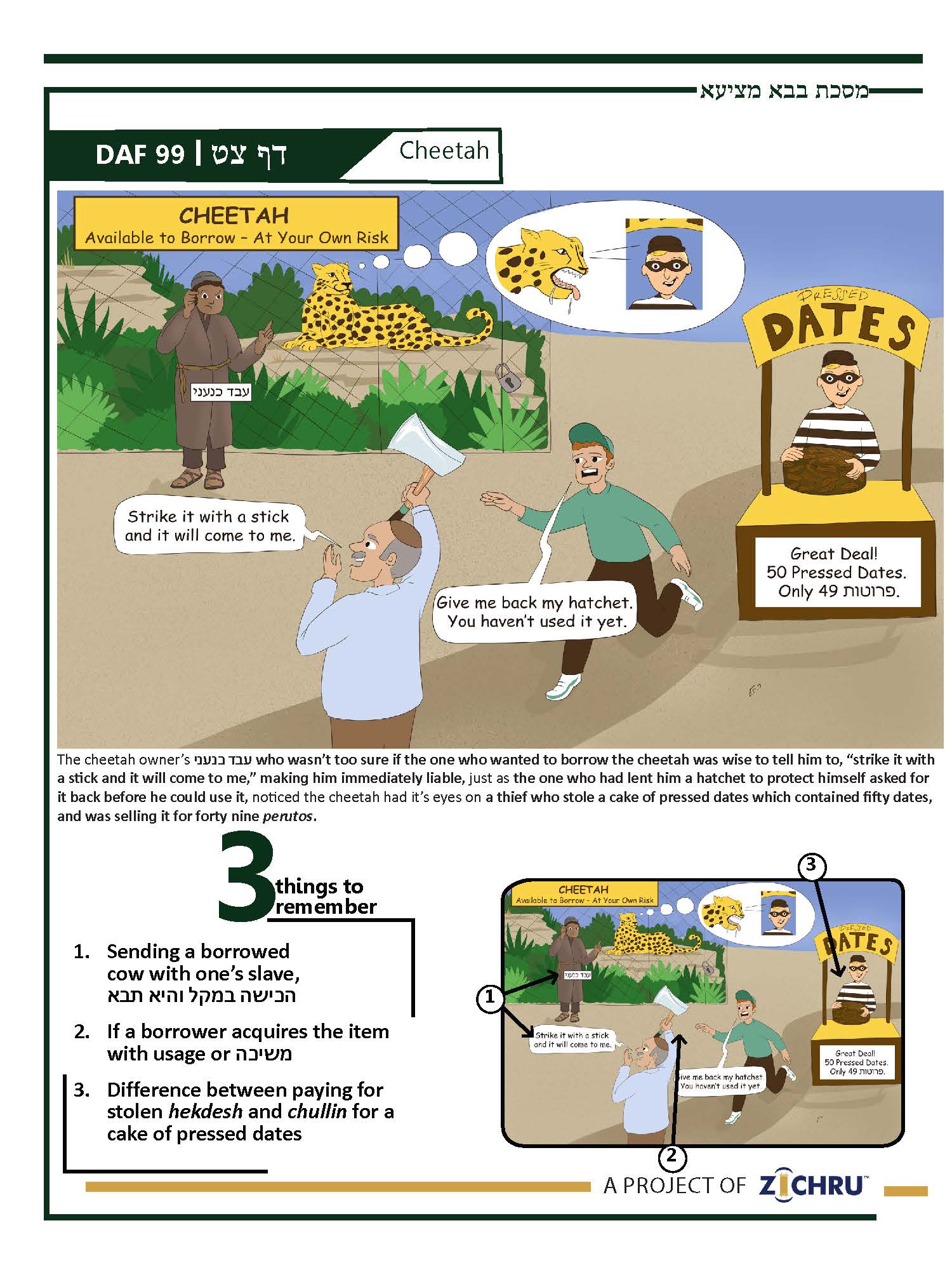Bava Metzia - Daf 99
- Audio Timestamps
0:00 - The 3 Sugyos
3:03 - Review of 3 Sugyos
5:49 - Siman
8:38 - 4 Blatt Back Chazarah
16:13 - Pop Quiz (Last 7 blatt)
- For access to all Zichru resources including PDFs, and illustrations CLICK HERE
- Sending a borrowed cow with one’s slave, הכישה במקל והיא תבא
The Mishnah had taught that if the owner sent the cow with his own slave at the borrower’s request, the borrower is immediately liable. The Gemara objects: יד עבד כיד רבו – but a slave’s hand is halachically like the owner’s hand, and it should remain in the owner’s possession!? Shmuel answers that the Mishnah refers to sending with his עבד עברי, דלא קני ליה גופיה – whose physical self the master does not acquire. Therefore, the borrower becomes liable while the servant transports it. Rav says the Mishnah can refer to an עבד כנעני, but the case is, as the Gemara concludes, where the borrower said: הכישה במקל והיא תבא – “Strike it with a stick, and it will come to me.” Rav ruled about such a case: כיון שיצאת מרשות משאיל ומתה חייב – as soon as it left the lender’s domain and died, [the borrower] is liable.
- f a borrower acquires the item with usage or משיכה
Rav Huna said: השואל קרדום מחבירו – regarding one who borrows a hatchet from his fellow, בקע בו קנאו – if he chopped with it, he acquired it, but does not acquire it beforehand. Since a שואל is liable for אונסין even before acquiring it, Rav Huna’s ruling must have been לחזרה – regarding the owner’s retraction from the loan. He may retract until the borrower acquires the hatchet, after which it is in the borrower’s domain for the loan period. Rav Huna says a שואל acquires with usage, and not משיכה, which disagrees with Rebbe Ami, who said: המשאיל קרדום של הקדש – one who lends a hatchet of hekdesh to someone, מעל לפי טובת הנאה שבו – violated me’ilah equal to the pleasure of benefit gained from [the loan] (i.e., the borrower’s gratitude to him), which must be repaid to hekdesh, וחבירו מותר לבקע בו לכתחילה – and his fellow the borrower is fully permitted to chop with it, because that usage was already converted to chullin through the loan. Rebbe Ami must hold the borrower acquires the loan with the original משיכה, before the usage, because otherwise the me’ilah did not yet take place, and it would not be permitted to use. Rebbe Elazar, as well as a Baraisa, also says: כדרך שתקנו משיכה בלקוחות – just as they instituted משיכה for purchasers, כך תקנו משיכה בשומרים – so too they instituted משיכה for שומרים.
- Difference between paying for stolen hekdesh and chullin for a cake of pressed dates
Shmuel said that if one stole a cake of pressed dates which contains fifty dates, which are sold together for forty-nine perutos, but can be sold individually for a perutah each (totaling fifty), then if the cake belonged to an ordinary person, he pays forty-nine, but if it belonged to hekdesh, he pays fifty (plus the additional surcharge of a fifth). The Gemara explains that although the private owner can claim he would have sold the dates individually, so his loss is fifty perutos, a Mishnah teaches that damages of crops are assessed not based on their own value, but in the broader context of the field’s selling value. Thus, damages to a private individual (as well as theft, a form of damage) are assessed leniently.
The Gemara asks that this contradicts another ruling of Shmuel’s: a Mishnah teaches that if one stole a beam from hekdesh and built it into his house, he violates me’ilah after benefiting from it. Shmuel derived from this that if one lives in his fellow’s house without his knowledge, he must pay him. We see that Shmuel equated hekdesh’s payment to that of a הדיוט!? The Gemara concludes that Shmuel retracted from this latter ruling.
Siman – Cheetah
The cheetah owner’s עבד כנעני who wasn’t too sure if the one who wanted to borrow the cheetah was wise to tell him to, “strike it with a stick and it will come to me,” making him immediately liable, just as the one who had lent him a hatchet to protect himself asked for it back before he could use it, noticed the cheetah had it’s eyes on a thief who stole a cake of pressed dates which contained fifty dates, and was selling it for forty nine perutos.


